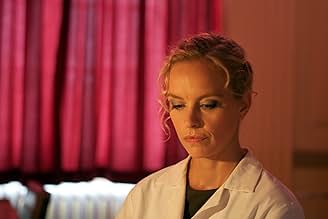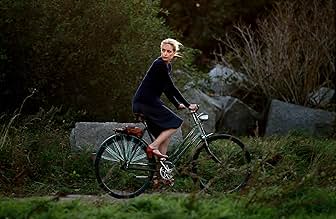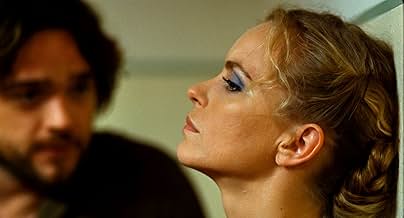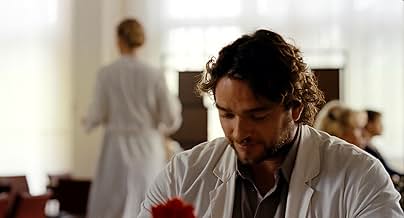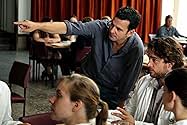A doctor working in 1980s East Germany finds herself banished to a small country hospital.A doctor working in 1980s East Germany finds herself banished to a small country hospital.A doctor working in 1980s East Germany finds herself banished to a small country hospital.
- Director
- Writers
- Stars
- Awards
- 10 wins & 24 nominations total
Claudia Geisler-Bading
- Stationsschwester Schlösser
- (as Claudia Geisler)
- Director
- Writers
- All cast & crew
- Production, box office & more at IMDbPro
Featured reviews
The story is set in East Germany in 1980, when it looked like Communism would last forever. Central character is Dr. Barbara Wolff, played by the classically beautiful blonde Nina Hoss, who I've previously seen in A Woman In Berlin. Dr. Wolff was a fast track young doctor at the Charite, the big teaching hospital in Berlin, before she fell in love with a West German businessman and applied for an exit visa. That got her a short spell in prison for ingratitude to the workers and farmers who paid for her medical education, together with a transfer to a one horse town in Mecklenburg, where she seems to be the second doctor in a two doctor pediatric clinic. We know all this because, as she is getting off the bus, the local Stasi man is going through her file with Andre, the head doctor at the clinic. Andre is what they used to call an Inoffiziale Mitarbeiter, or unofficial cooperator. We find out why later on. He's also an attractive, shambling 30 something bachelor in a kind of teddy bear way, a skilled, dedicated doctor with a good bedside manner, and, notwithstanding his work as an informer, a pretty decent guy by the standards of the time and place.
Barbara twigs immediately that Andre's an informer when he offers her a lift home from work on the first day. As they drive through an intersection in his piece of crap Trabant, she says, "you were supposed to ask me which way to turn, but then, you already know where I live." She is resentful, understandably so, and standoffish, which the clinic staff put down to stuck up Berlin attitude. That may have something to do with the open surveillance by the Stasi guy and regular searches of her apartment, complete with strip searches by a female agent. But Barbara is also a first class doctor who takes a real interest in her patients. Andre is quietly smitten -- if you've seen Hoss you'll know why -- and keeps chipping away at her resistance. Despite knowing who else he works for, she can't help responding.
What neither Andre nor the Stasi agent know is that Barbara is contriving to meet her Wessi boyfriend when he's in the East on business, and they're scheming to smuggle her out. He's crazy about her, even saying that he'd move East if she wants, but there are slight intimations that life in the West with him might not be exactly as she's dreamed of. In any event, there's a lot of sneaking about, and Hoss has a good line in tense body language and over the shoulder glances. Everybody knows everybody's business in a small town anyway, and in a small town in Mecklenburg, your landlady, your co-workers, or anyone you pass on the street could be an informer.
Complications ensue, involving Andre, the escape plan, and Barbara's obligations to two young patients in whom she has taken a special interest. I won't tell you how they play out, except that nothing goes quite as expected. The movie gives you a very good sense of a society in which everyone is compromised in some way, trust and intimacy are not really possible, but life has to go on nevertheless. It's not as showy as The Lives of Others, but it gives a better sense of what everyday life was like in the German Democratic Republic, where it has been estimated that there was one Stasi employee for every 165 citizens and one informer for every 6.5.
Barbara twigs immediately that Andre's an informer when he offers her a lift home from work on the first day. As they drive through an intersection in his piece of crap Trabant, she says, "you were supposed to ask me which way to turn, but then, you already know where I live." She is resentful, understandably so, and standoffish, which the clinic staff put down to stuck up Berlin attitude. That may have something to do with the open surveillance by the Stasi guy and regular searches of her apartment, complete with strip searches by a female agent. But Barbara is also a first class doctor who takes a real interest in her patients. Andre is quietly smitten -- if you've seen Hoss you'll know why -- and keeps chipping away at her resistance. Despite knowing who else he works for, she can't help responding.
What neither Andre nor the Stasi agent know is that Barbara is contriving to meet her Wessi boyfriend when he's in the East on business, and they're scheming to smuggle her out. He's crazy about her, even saying that he'd move East if she wants, but there are slight intimations that life in the West with him might not be exactly as she's dreamed of. In any event, there's a lot of sneaking about, and Hoss has a good line in tense body language and over the shoulder glances. Everybody knows everybody's business in a small town anyway, and in a small town in Mecklenburg, your landlady, your co-workers, or anyone you pass on the street could be an informer.
Complications ensue, involving Andre, the escape plan, and Barbara's obligations to two young patients in whom she has taken a special interest. I won't tell you how they play out, except that nothing goes quite as expected. The movie gives you a very good sense of a society in which everyone is compromised in some way, trust and intimacy are not really possible, but life has to go on nevertheless. It's not as showy as The Lives of Others, but it gives a better sense of what everyday life was like in the German Democratic Republic, where it has been estimated that there was one Stasi employee for every 165 citizens and one informer for every 6.5.
10yagian
I visited Eastern Europe, Berlin, Prague, and Budapest, in March 1990. At that time, the Berlin Wall had already been fallen down, but Germany had not reunited yet.
People could freely come and go over the borders between East and West Germany. I went through Checkpoint Charlie to East Berlin, and I visited retro-future TV tower and saw Ladas running on street.
In a night train from Berlin to Prague, I asked a passenger who sat next to me if Germany would reunite in a year, and he answered that he didn't believe it would happen so early. In fact, Germany reunited in October 1990.
Although I actually visited East Berlin, now, it is hardly for me to believe that the half of Germany was a communist state just twenty-three years ago.
--------------------
"Barbara" is a German film about people living in East Germany in 1980. Barbara is a female doctor, who was watched by the secret police.
It is one of the greatest German films that I have ever seen. There is no exaggeration and omission in this film. Every element in it is necessary, and I couldn't find that any things were unnecessary.
This film is very quiet, because there is no background music. That makes audience concentrated in every tiny sound. Barbara was always nervous about the secret police, so she got surprised when the doorbell started to ring, and the audience also got really surprised with the sound of the doorbell, and fully understood her emotion.
Nina Hoss, as Barbara, was also great and attractive. She didn't overplay at all, but accurately expressed how Barbara felt in her mind. After seeing her performance, most actors and actress became to look unnatural.
This film is a quiet, simple, and elegant. If you love films, I strongly recommend you to see it.
People could freely come and go over the borders between East and West Germany. I went through Checkpoint Charlie to East Berlin, and I visited retro-future TV tower and saw Ladas running on street.
In a night train from Berlin to Prague, I asked a passenger who sat next to me if Germany would reunite in a year, and he answered that he didn't believe it would happen so early. In fact, Germany reunited in October 1990.
Although I actually visited East Berlin, now, it is hardly for me to believe that the half of Germany was a communist state just twenty-three years ago.
--------------------
"Barbara" is a German film about people living in East Germany in 1980. Barbara is a female doctor, who was watched by the secret police.
It is one of the greatest German films that I have ever seen. There is no exaggeration and omission in this film. Every element in it is necessary, and I couldn't find that any things were unnecessary.
This film is very quiet, because there is no background music. That makes audience concentrated in every tiny sound. Barbara was always nervous about the secret police, so she got surprised when the doorbell started to ring, and the audience also got really surprised with the sound of the doorbell, and fully understood her emotion.
Nina Hoss, as Barbara, was also great and attractive. She didn't overplay at all, but accurately expressed how Barbara felt in her mind. After seeing her performance, most actors and actress became to look unnatural.
This film is a quiet, simple, and elegant. If you love films, I strongly recommend you to see it.
Yes, I worked in the old DDR. Living in London, and being a graduate engineer able to speak German, I was hired by a company importing machinery from the DDR to be their liaison man at the factory in East Berlin, and spent a number of lengthy periods over there in the late 60s and early 70s. I very much settled into working life there, and would socialise with the other engineers at the factory. I even had a local girlfriend for a while!
I recall the mindless bureaucracy, the often petty limitations on what everyone could do, and of course the ubiquitous police presence. In order to have my car to get around during these long tours of duty, I would usually take the ferry and drive there, and on one occasion I got harangued by a cop who told me my car was too dirty and that having a dirty car was strictly forbidden in the DDR!!
This movie depicts an era a decade later, and some things had changed. I remember many older people expressing considerable enthusiasm for their 'socialist utopia', largely because they felt their lives were massively better than under the Nazis and during the war years. But there was also a rising generation who wanted what people in the west had, a desire which had a particularly curious form of expression in Levi jeans! These were like gold dust, and sometimes at weekends I would pop through Checkpoint Charlie into West Berlin, and buy half a dozen pairs to give to my friends. Barbara and André were very much of that generation, Schütz was distinctly of the old guard.
So for me, the movie played out against a familiar background, and the agonising personal decisions this forced upon the central characters had great reality. Both Barbara and André were portrayed very much as caring doctors, placed in intolerable situations by the heavy and unfeeling hand of the state. The movie very cleverly kept us all in the dark, as we speculated how it might end. Well worth watching to find out!
It's a challenging task to depict a bygone era which hasn't yet passed into history, but is a living memory in the minds of many. Distant events may be easily interpreted at will, because no spectator can expect a minute reconstruction of a reality past. Adaptations of recent events, however, fall under close scrutiny of those who were actually there, and any attempt to 'tell the whole story' will invariably meet with criticism from those who feel left out of the picture, or who remember differently. It is therefore the best solution for the film maker to focus on atmosphere rather than events, and a simple story rather than a complex rendition of society as a whole. And that's what director/ screenwriter Christian Petzold does: he tells the story of a doctor, displaced from the capital to the province for an application to leave the country, and confronting an atmosphere of distrust while preparing her escape to the West. This routine of hostility is a little ameliorated by the interest of a male colleague, who may however be an assigned informer, and the friendship to a pregnant patient, who apparently escaped from a juvenile offenders camp only to be recaptured.
What makes me consider this film as far superior to the much lauded, Oscar-winning 'The Lives of Others' is that it does not sacrifice atmosphere to film making conventions. For instance, there is no music, because there was no music. 'The Lives of Others' tormented any actual witness of the times it described with a sappy soundtrack. It also did not correspond to my recollections of East Germany because it limited the supervision of ordinary citizens to the Stasi ('State Security') and its collaborators. It did point out that this supervision was omnipresent, but it created a division between good and evil which was slowly eroded from the evil side's end. 'Barbara', however, focuses on the way ordinary citizens, not intellectuals, were treated, and the fact that virtually everyone collaborated in the supervision of the individual, whether they were working with the Stasi or not. Barbara is fully aware of her situation, and tries to make friends with her colleague/informer André Reiser to win him over to her side, while at the same time not giving anything away about herself. Reiser, on the other hand, tries to gain her trust as a person, because he needs her competence at work and may be romantically interested in her, while at the same time fulfilling his obligations to report on her.
This constant game of hide and seek illustrates what Socialism was really like - a permanent grey zone in which you had to measure your steps carefully and no clear distinctions between good and evil existed, as 'The Lives of Others' would have you believe; and the young patient side characters show that quite a few cracked under this immense pressure. By focusing on one woman's story, director Petzold delivers an accurate portrait of the realities of life at that time: it did not matter whether you were good at your job or not, and being too good made you automatically suspicious, while being lazy made you the target of accusations of boycotting society; it was dangerous to open up to colleagues, because they would almost certainly be inquired about what you said, but at the same time it was dangerous to distance yourself, because then you'd be suspected of having something to hide. Everything was tactics, nothing was spontaneous, everybody wanted to get out, but chastised those who actually tried. This authenticity has probably prompted this film's selection as the German candidate for the foreign language Oscar 2013, but it may also have hampered its chances to win the Golden Bear upon its premiere at the Berlin Film Festival, where Petzold won the director's prize though. Realism makes for an accurate portrayal of the recent past, but for those who have not been there, 'Barbara' may be a bit too stiff and gloomy, because it does not compromise its authenticity to the expectations of (Western) audiences.
What makes me consider this film as far superior to the much lauded, Oscar-winning 'The Lives of Others' is that it does not sacrifice atmosphere to film making conventions. For instance, there is no music, because there was no music. 'The Lives of Others' tormented any actual witness of the times it described with a sappy soundtrack. It also did not correspond to my recollections of East Germany because it limited the supervision of ordinary citizens to the Stasi ('State Security') and its collaborators. It did point out that this supervision was omnipresent, but it created a division between good and evil which was slowly eroded from the evil side's end. 'Barbara', however, focuses on the way ordinary citizens, not intellectuals, were treated, and the fact that virtually everyone collaborated in the supervision of the individual, whether they were working with the Stasi or not. Barbara is fully aware of her situation, and tries to make friends with her colleague/informer André Reiser to win him over to her side, while at the same time not giving anything away about herself. Reiser, on the other hand, tries to gain her trust as a person, because he needs her competence at work and may be romantically interested in her, while at the same time fulfilling his obligations to report on her.
This constant game of hide and seek illustrates what Socialism was really like - a permanent grey zone in which you had to measure your steps carefully and no clear distinctions between good and evil existed, as 'The Lives of Others' would have you believe; and the young patient side characters show that quite a few cracked under this immense pressure. By focusing on one woman's story, director Petzold delivers an accurate portrait of the realities of life at that time: it did not matter whether you were good at your job or not, and being too good made you automatically suspicious, while being lazy made you the target of accusations of boycotting society; it was dangerous to open up to colleagues, because they would almost certainly be inquired about what you said, but at the same time it was dangerous to distance yourself, because then you'd be suspected of having something to hide. Everything was tactics, nothing was spontaneous, everybody wanted to get out, but chastised those who actually tried. This authenticity has probably prompted this film's selection as the German candidate for the foreign language Oscar 2013, but it may also have hampered its chances to win the Golden Bear upon its premiere at the Berlin Film Festival, where Petzold won the director's prize though. Realism makes for an accurate portrayal of the recent past, but for those who have not been there, 'Barbara' may be a bit too stiff and gloomy, because it does not compromise its authenticity to the expectations of (Western) audiences.
BARBARA may be a little too slow and humorless for many tastes, but it's one of those films that's so real it hardly seems like a film at all. You have to admire the stark realism here. Whether you want to go there or not, this film truly takes you to a secluded province of East Germany, 1980. BARBARA affords an acute look at the inside of a totalitarian state. While it doesn't show a whole lot in this regard, what it does is shown most effectively. The lack of any soundtrack--something I didn't even notice while viewing but that one of the reviews on Amazon pointed out--only adds to BARBARA's immediacy. Quietly immersing, with a real surprise at the end. Excellent cinematography and fine acting by all.
Storyline
Did you know
- TriviaThe Torgau workhouse to which Stella is sent is the Torgau Juvenile Detention Centre. The Centre, which ran from 1964 to 1989, was for the "re-education" of young people aged 14 to 18. Inmates had committed no crimes, but were deemed to need education so that they could fit in with the norms of socialist life in East Germany.
- GoofsAndre hands Barbara a cup of coffee, which she promptly drops. You see the shattered pieces of the cup on the floor, but no coffee.
- Quotes
André: Doctor Wolff will be working with us. She is from Berlin... from the Charite Hospital, and has decided...
Assistenzärztin Schulze: We have introduced ourselves.
- ConnectionsFollowed by Phoenix (2014)
- SoundtracksNocturne g-moll Opus 15 No. 3
Composed by Frédéric Chopin
- How long is Barbara?Powered by Alexa
Details
- Release date
- Country of origin
- Official sites
- Language
- Also known as
- Bárbara
- Filming locations
- Production companies
- See more company credits at IMDbPro
Box office
- Gross US & Canada
- $1,013,902
- Opening weekend US & Canada
- $63,410
- Dec 23, 2012
- Gross worldwide
- $6,908,277
- Runtime1 hour 45 minutes
- Color
- Sound mix
- Aspect ratio
- 1.85 : 1
Contribute to this page
Suggest an edit or add missing content




